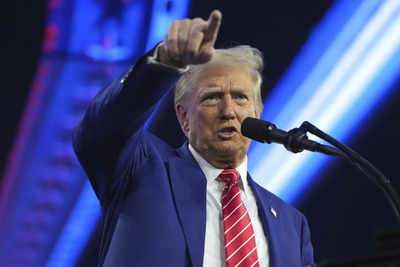- News
- World News
- US News
- Trump trolls Canada as 51st state — But what if it actually happened?
Trending
Trump trolls Canada as 51st state — But what if it actually happened?
President-elect Donald Trump has once again turned heads with his latest comments about Canada — this time suggesting the country should join the US as its 51st state. Speaking from his Mar-a-Lago resort in Palm Beach, Florida, Trump jokingly mused about the merger, saying, "Canada and the United States. That would really be something. They should be a state."
Trump went on to elaborate that such a union wouldn’t involve military action but rather “economic force,” implying that a more integrated North American economy could be a win for both nations. A day prior, he fueled the conversation further with a social media post, claiming that “many people in Canada LOVE being the 51st State.”
The former president emphasized the potential benefits, touting a union as a way to eliminate tariffs, lower taxes, and protect Canada from external threats, particularly from Russian and Chinese naval forces. "Together, what a great nation it would be!" he declared.
A Blue-State Behemoth?
If Canada did somehow become part of the United States, the political ramifications could be significant. With a population of over 40 million, Canada would immediately become the largest state in the Union, surpassing California. But the political shift might be even more profound.
Canada has a history of left-leaning governments, with the Liberal Party in power for much of the last century. As a result, political analysts believe Canada would likely lean toward the Democratic side, boosting the party’s influence in the US Congress and presidential elections, reported Fox News.
“It would be a massive political boon for Democrats,” said veteran Republican strategist Dave Carney. "The voters who have supported Canada’s Liberal governments would probably vote for Democrats."
Political experts predict Canada’s inclusion would reshape US electoral dynamics. With two Democratic senators and millions of electoral votes, Canada would make a strong case for Democratic dominance. As Rich Lowry, editor-in-chief of National Review, warned, "Canada would be a blue-state behemoth, matching California in population and, presumably, in reliably Democratic politics," reported Fox News.
Could Trump really pull it off?
While the idea remains far-fetched, some believe Trump’s bold statements are part of a larger strategy aimed at negotiating with Canada. Carney, who has advised Texas Gov. Greg Abbott and worked on numerous Republican presidential campaigns, suggests that Trump is playing a long game with these remarks.
“Trump uses tools that no one would ever think of,” Carney said. "He’s able to leverage soft power to get people to pay attention and push his agenda forward." Indeed, Trump’s comments could be seen as a way to influence discussions with Canada on trade and security issues, reported Fox News.
The "What if" factor
What if, against all odds, Canada actually joined the US? Political scientists like Wayne Lesperance predict that it would tip the scales in favor of the Democratic Party. "With 40 million voters and a congressman and senator delegation that’s more likely to oppose Trump, this would be a huge shift," Lesperance said.
Democratic strategist Van Jones echoed this sentiment, calling Canada “a huge blue state” and even welcoming the hypothetical notion. "If Canada wants to come here and rescue us, I am more than happy."
But let’s be real. While the idea of Canada becoming the 51st state is more fantasy than reality, it’s a scenario that has ignited plenty of political speculation and intrigue. So far, it seems like just another one of Trump’s playful provocations—but who knows? In his world, anything’s possible.
End of Article
FOLLOW US ON SOCIAL MEDIA












